SEO Guides, Tips & More!
Learn from Our Experience
5 Tips for Keyword Research in 2019
Over the years accounting and law firm marketers have become increasingly familiar with search engine optimization (SEO). There are dozens of tutorials available online for the curious or otherwise inclined to learn about on-page optimization including how to add, edit and update on-page SEO elements such as meta title, meta description and other elements. Even those with little interest in the subject matter have come to understand the concepts and basic principles behind how the pieces fit together. This is fantastic because it allows marketers to deliver more value within their firm and overall digital marketing efforts. It should be noted however that one area where we routinely see professionals struggle is with keyword research. This can be a challenging area because not only is it an intimidating area to get started in, but there are also many different ways to approach it.
The truth is that keyword research is one of the most important foundational aspects of SEO that marketers need to focus on. If you are like many, the keywords selected are the result of a hunch or a combination of terms that make the most sense based on the geography and services, the firm offers. Such examples may include “Denver law firm”, “Denver CPA firm” or even “Denver attorney”. While these are logical starting points, they lack when it comes to driving a high volume of qualified traffic to a website. This is something I suspect many marketers have discovered and therefore it has propelled them to better understand the process or hire an agency to manage it for them.
Why is Keyword Research Important?
Keyword focus determines what your firm or company is known for and what it is not. In other words, keywords ensure your website (and its content assuming you are using keywords to drive content development) is positioned in searches where your prospects are looking. Keyword research is the most important step for your SEO and other online marketing efforts. The truth is that if you don’t know what keyword terms to target, it’s going to be almost impossible to drive traffic, determine ROI and most importantly generate leads.
Okay, so what can marketers do to get the process started? After all, we all want our website to generate more leads.
Identify What Terms Your Site Ranks On
The first step in keyword research is to understand where the website is already ranking. This will give insight to the natural strengths of the site and where you may have the opportunity to quickly move up in the rankings for keyword terms that are already performing.
There are several tools you can use to generate the list of these terms. In fact, I recommend using more than one tool when compiling the list to get as comprehensive a view as possible when starting out.
Below is a site ranking analysis for the Big 4 firm, Ernst & Young from the popular online SEO software – moz.com. Note that the below report was generated from the subscription version of their website, but there are free tools available as well which we will also show.

Assuming you work for this firm, you have a lot of opportunity because the site ranks for roughly 45,000 keyword terms.
Using the free tool – Ubersuggest.com – the below list was generated for the Moss Adams website.
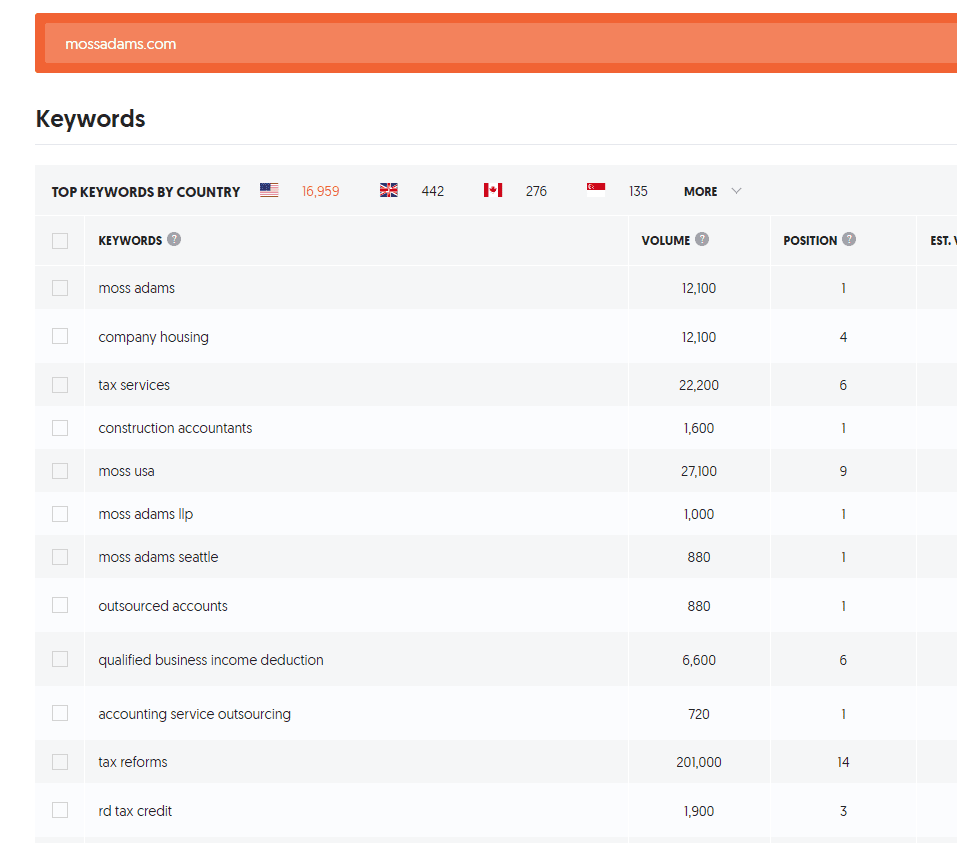
Both reports show the position or keyword rank as a value of 1-25 or higher. We are often asked what this value means. Does it mean the website ranks on the 4th page of Google? The answer is no.
What it means is the site for that specific term ranks in position 4 in the search engine result page (SERP). A position of 5 would mean the site ranks on page 1 of the Google SERP in position 5. A position of 14 would indicate the site ranks on page 2 of the Google SERP in position 4.
Both tools offer the opportunity to download the list into a .csv or another Excel based format for additional analysis and review. Download the report and save it in Excel for later tracking and analysis.
Identify What Terms Your Competitors Rank On
This step is usually missed because although law and accounting firms are ultra-competitive, they are often unaware such an analysis is possible. The good news is that assessing your competitors using these tools can provide important insights into where you may want to focus targeting efforts. It’s also a good exercise to determine if they are actively engaging in SEO as well as the effectiveness of their efforts.
Interesting Story – FlashPoint works with a firm that offers a very specialized service to a highly regulated industry. The client often remarked that they wondered what their competitors in the same space were doing in terms of SEO. The assumption was they were very active because they are well known, and this client would often check what the other company was doing to ensure nothing was being missed. After conducting a keyword analysis of the competitors’ website, I determined they were doing very little, if any, keyword optimization.
The client was stunned and didn’t know what to think. The assumption that was had about their competitors’ marketing efforts were totally shattered. The good news is the exercise revealed an opportunity for their firm to begin targeting and saturating various keyword groupings to gain an upper hand against competitors.
The lesson learned is that just because you think a competitor is well known or doing things right doesn’t mean that automatically transfers over into SEO or digital marketing efforts. At the very least, conducting a competitor keyword analysis will give you an understanding where the competition is, how your site ranks in comparison and ideas for new terms to target if you believe they are relevant and meaningful for your site.
Below is a screen capture from the same Moz.com tool as previously mentioned. One thing I love about the Moz paid tool is that it allows you to compare your site with up to two other competitor domains and download the results into an editable Excel document. This is quite useful when reviewing results and identifying what terms you want to pursue. In this example, we are showing the results for the Ernst & Young and Moss Adams sites together.
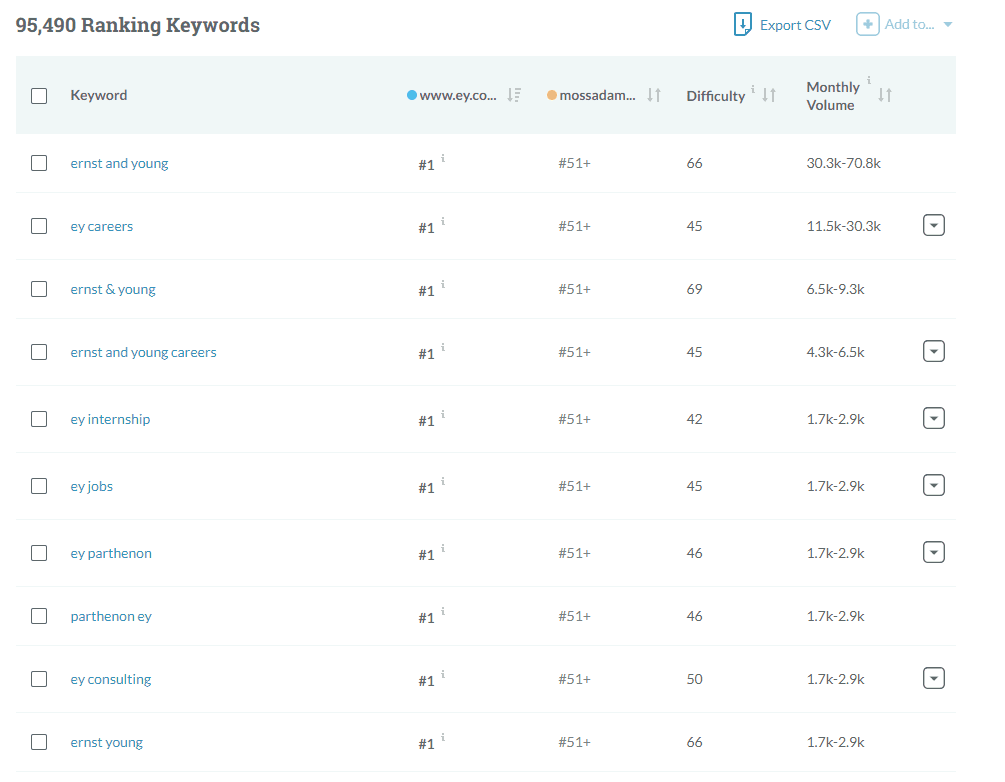
As you can see from the summary function below, there are 1,400 keywords that have overlap and this is the area where you want to focus initially. However, that doesn’t mean you should ignore the other keyword terms. Obviously, your site will not want to target branded keyword terms (terms with the name of the competitor) but there may be other terms where there is not overlap which could be of interest.
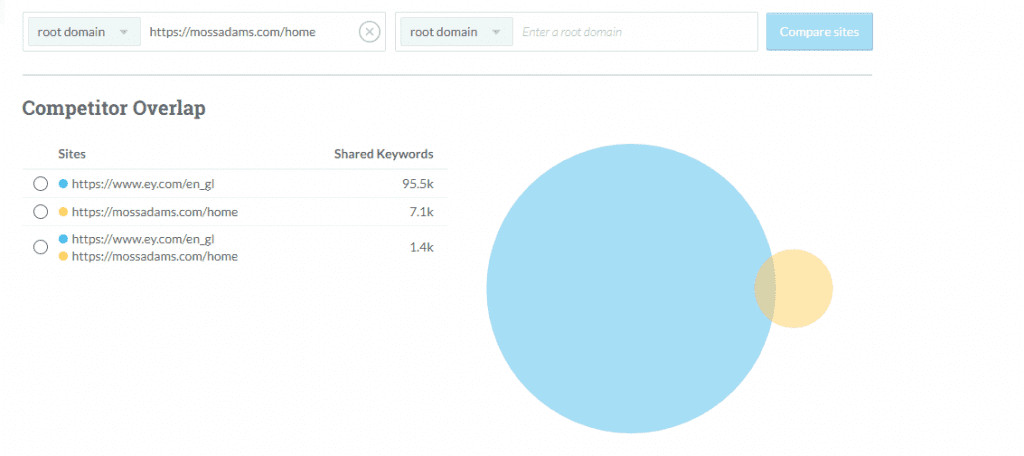
Identify Seed Keyword Terms
Once you have your baseline rankings and are aware of the existing opportunities with your site, don’t stop there. If you are just getting started or have limited time or resources, it could be a good place to pause and dig into tactics to press the firm’s ranking for these terms. However, effective keyword research does require you to go further and work with seed keywords.
What are Seed Keywords?
They are base or foundational keywords used in SEO. The meaning of these terms is not changed or modified when additional descriptive terms such as geography are added. They serve as a basis from which long tail keyword terms can be developed using the formula of seed keyword + modifier. There is a great discussion about seed keywords with various explanations and additional insight on Quora.com.
Finding the right seed keywords can be challenging because most don’t know where to begin. As discussed earlier in this post, outside of the “hunches” we have about important terms, there is often uncertainty in this area. There is when using a free tool comes into play because it can help you get started in developing your seed keyword list. The name of the free tool is seed keywords and it works by using search scenarios applicable to your target prospect to find relevant seed terms. It’s a unique product because it allows you to share the scenario with colleagues, friends and others to test their preferences and behavior. Once complete, the tool will provide you with the appropriate seed keywords. We have used this tool many times and are almost always surprised by the results.

Although this process takes a little more time and work then other identification processes, it’s a great tool because the data is collected in real time and made from actual behaviors and responses. The insights gathered in the process will identify the most relevant seed keywords and drive a higher level of engagement.
Don’t Forget Question Based Keywords
Over the past few years Google has made a lot of changes to the SERP. They have even begun to answer questions to common searches directly on the result page. This is really interesting because it tells us not only how Google wants to serve it’s customers but also opens the door to a new kind of ranking/keyword opportunity.
The example below shows how Google provides an answer to a question and features it above all organic results (but below paid). Here we have asked what is the cost of a 401k plan audit? The featured result is Google’s best identified answer to the question.

Identifying the right question-based keyword terms to target is essential to capturing this space and creating content that speaks to the needs of your prospects. The above example is a very basic version of the type of question which your prospects may inquire about with Google.
The challenge in keyword research is to identify the question terms that make the most sense.
Check out Answer the Public for a free tool that can help you get the process started. While we use the paid Moz.com feature, Answer the Public is a free product that many marketers can use to launch their efforts.
The screen capture below shows the initial results when you enter a keyword term along with select questions that potentially correspond to the keyword terms. While the results are graphical in nature, I like that it uses various question-based terms to branch out to find relevant questions that users may ask. For example, the who, what, when, where, why and how question terms are included in the results along with applicable terms. This is pretty cool and lead to some interesting results.
The results from this search should populate this section of your list. For some marketers, this will be valuable information because you can take it to your internal professionals and ask them to write content for the firm blog that answers these questions. In fact, many of our clients use question-based keywords as a way to engage staff in the client development process. Just remember, if you are going to focus on question-based keywords, you will most likely need to write blogs that answer the questions. Otherwise, it may be incredibly difficult to rank for these terms.

The Answer the Public free tool also provides a list of comprehensive keyword terms if you are interested in using this tool as another source of information.
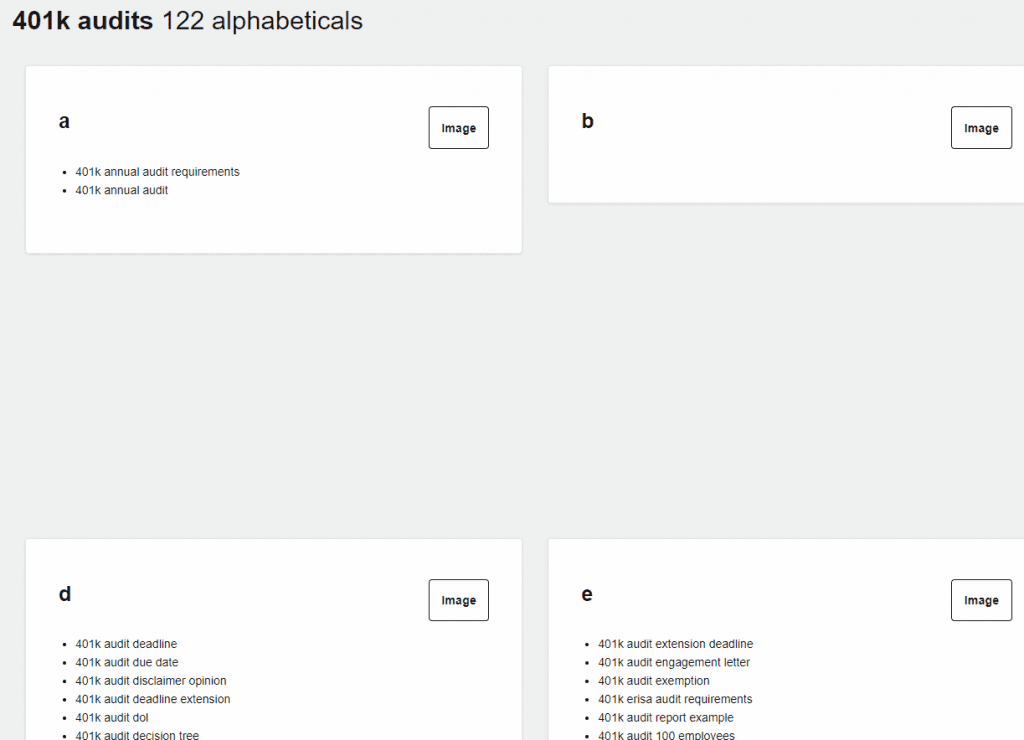
Know Keyword Potential
Once you have a list of keywords to target, the last step is to understand keyword’s potential. SEMRush offers the ability to quickly check keyword potential. The example below is for the term “keyword research”. As you can see, there is a lot going on with the blue bars. This indicates there are a lot of searches for this term and therefore a lot of competition. Depending on various factors you may need to invest time to make a dent in the rankings for this particular term.
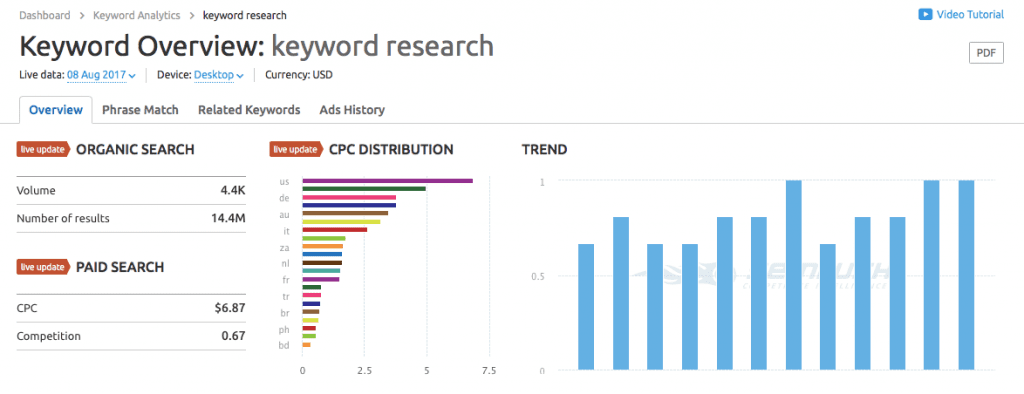
The other metric you want to assess is organic search volume. Unless you are targeting a specific service with a very limited number of buyers, the lower the volume, it’s logical to assume the less value the term will have in your plan. Ranking well on a term that very few people search on makes little sense. So, this information is important to understand not only what terms to target, but what the expected result could be once you accomplish your goal.
Conclusion
Keyword research is a bit of an art form and like anything else requires time and practice.
The truth is many marketers will have no idea what the right terms are or which ones have the best potential for their website. However, the number of free (and paid) keyword research tools available opens the door to great opportunities to identify terms and work from a starting point.
Don’t feel shy, jump in and start working the process. The results will not only allow you to understand what terms you can target, but also will help to shape content development efforts.
What tips and tricks are you using in your keyword research?

